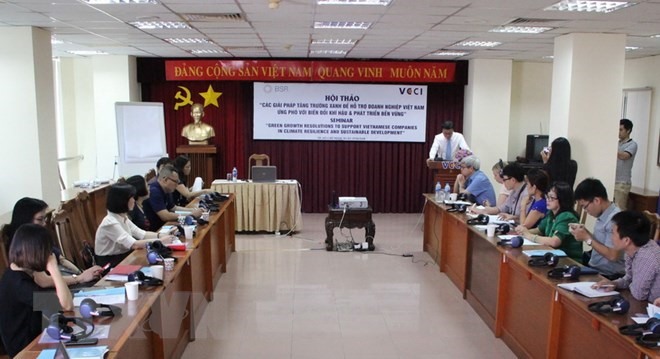Green growth is an effective sustainable development solution for businesses to counter the effects of climate change, said experts at a conference held in HCM City on April 19.

Green growth is an effective sustainable development solution for businesses to counter the effects of climate change, said experts at a conference held in HCM City on Thursday.
The conference, organised by the Vietnam Chamber of Commerce and Industry in HCM City (VCCI-HCM), aimed to help Vietnamese businesses cope with climate change and develop green growth.
Deputy Director of VCCI-HCM Nguyen The Hung said that climate change was a major problem affecting the global socio-economic situation, in which Viet Nam was one of the countries most severely affected.
According to statistics, more than 300 people die or go missing due to natural disasters in Viet Nam every year. Economic losses from natural disasters amounted to between 1-1.5 per cent of GDP.
Last year, the country suffered a loss of about VND60 trillion (US$2.64 billion) due to natural disasters.
“Green growth is an approach to production and services that brings economic benefits to businesses, while minimising the impacts of climate change and ensuring sustainable development. This is also in line with demands for building an innovative model of growth, and restructuring the economy of Viet Nam in the coming period,” said Hung.
Phung Chi Sy, director of Centre for Environmental Technology of the Vietnam Association for Conservation of Nature and Environment, said that the benefits of green growth were shown in the conservation of energy, raw materials and water, as well as in reduced labour costs, environmental consequences of production, and the reduction of emissions.
“Green growth is an important component of sustainable development, and part of the national strategy on climate change. The implementation of green growth will be based on increased investment in the efficient use of capital resources, the reduction of greenhouse gas emissions, and improvements in the quality of the environment.
“It is needed to enhance the efficiency of energy use while reducing energy consumption in production. It is also instrumental in creating sustainable industry and transportation for trade.
“It’s necessary to adjust the planning of production industries, and limit those economic sectors that generate large waste, in addition to creating conditions for the development of new green industries,” said Sy.
"Each industrial production enterprise should actively research and develop a blueprint for green growth towards sustainable development in the 4.0 industrial revolution in Viet Nam by 2030, with orientation to 2050,” he added.
Managing Director of Ingreetech Company Nguyen Xuan Hien said that investors were still afraid of investing in green growth.
As for investment in solar energy, Hien said that it would need to be mass produced before becoming a cost effective alternative to current energy sources. The cost of renting land for solar farms is high, while the selling price of solar energy is just VND2,000 per kWh, half of its cost to produce.
“It is necessary to have preferential policies on land leasing, and a higher selling price for solar energy,” said Hien.
Nguyen Hong Son, economic lecturer of University of Natural Resources and Environment of HCM City said that his city was a pioneer in the application of science and technology on clean farming models and green production.
He said that in clean agriculture, the production cost and product price were about two or three times higher than traditional production methods, as a result the market for consumption was limited.
“If cleaner production units increase in scale, area and productivity, the supply will be larger than demand and product price will be reduced accordingly,” said Son.
Many consumers still opted for cheap products, therefore, the State management agencies needed to handle dirty production establishments, and encouraged people to use clean and safe food to protect their health, said Son. — VNS





